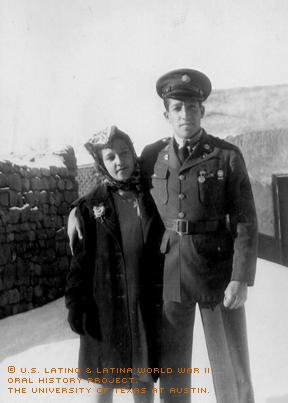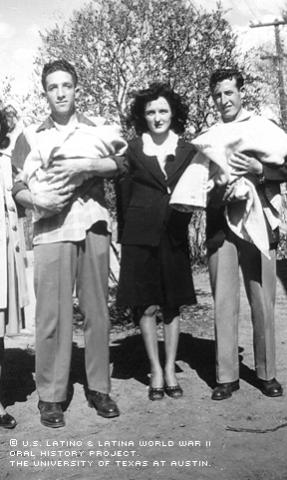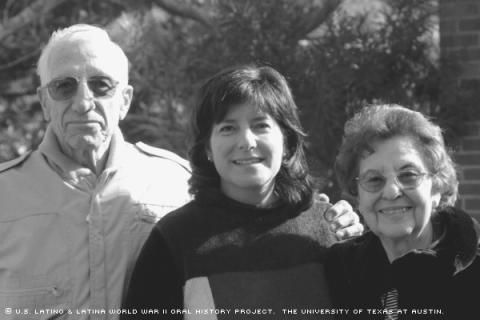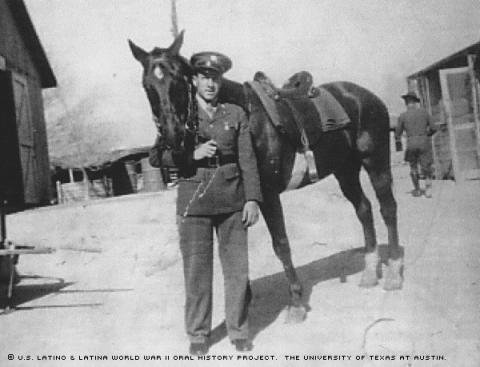



By Alyssa Green
After dropping out of high school in 1940, Alfonso Rodriguez found himself doing what he considered menial jobs -- sweeping floors, working in a grocery store, hauling garbage and selling newspapers.
Rodriguez figured there had to be a better way to make a living, so he decided to join the Army, enlisting Dec. 31, 1940. It was peacetime then, and Rodriguez joined with the expectation he’d get to see the world.
A year later, however, Rodriguez was pulled directly into World War II after the bombing of Pearl Harbor by the Japanese.
"My mother and my father did not want me to go [into the service]," Rodriguez said. "On that day [that he enlisted], I thought that I was going to the other side of the world."
Rodriguez was right. He did find himself on the other side of the world. But he’d be there under rugged battlefield conditions in a war that tested him in many ways.
He’d encounter racial discrimination in the military, he says, but more important, he’d survive the war.
Out of the many sports Rodriguez participated in, boxing was never one of them until he says faced discrimination while in the service. At the age of 18, Rodriguez wasn’t expecting this particular obstacle.
"I was in recruit training the first time that I felt racial discrimination." Rodriguez said.
He and fellow Mexican American soldiers were sitting around speaking in Spanish when an Anglo GI approached them, demanding they stop speaking Spanish and, instead, speak English, "like Americans," Rodriguez says. After engaging in an argument, Rodriguez recalls the white soldier, who was much bigger than he was, slapping him around and storming off.
Several weeks later, after a friend taught Rodriguez some boxing moves, he says he confronted the Anglo soldier and returned the favor.
"I was angry," Rodriguez said. "When I hit him, I laid him out on the floor. He took off running and never bothered us anymore."
Rodriguez was born August 22, 1922, in Santa Fe, N.M. He says his family was fortunate during the Great Depression years of the 1930s. They had a ranch in the Glorieta Mesa, with goats and cattle, and got by better than other folks.
"A lot of people were very poor. They didn't have anything to eat," Rodriguez said. "It was horrible. I remember people would come to the house and my mom would cook them something to eat. Others stayed overnight."
He recalls the family ranch being self sustaining.
"My dad never worked anyplace else but on my grandfather's ranch," Rodriguez said. "We made a living out of the farm, selling goats, cattle and sheep."
Rodriguez recalls encountering little to no prejudice growing up.
"My friends were Anglo, Chinese and we all played together," Rodriguez said. "We never thought anything of it. I grew up speaking English and Spanish."
Rodriguez loved sports and played baseball, football and basketball at Santa Fe High School. He says he dropped out of school after finding out from a coach that he’d failed a subject, which would have prevented him from playing basketball.
At the beginning of 1941, Rodriguez reported to Fort Bliss, Texas, for basic training. He remained there until 1943, reaching the rank of Corporal in the 2nd Calvary Brigade of the 1st Cavalry Division (Mounted). The brigade controlled the famed 7th and 8th Cavalry Regiments of Indian Wars fame.
On July, 11, 1943, in the midst of war, Rodriguez was shipped to Brisbane, Australia, along with 18,000 troops.
From Australia, Rodriguez and his brigade were moved to New Guinea in January of 1944, where he saw his first sign of battle. The unit later participated in the invasion of Los Negros Island on March 15, 1944.
He suffered his first injury on Manus Island.
"They shot the heel of my foot," said Rodriguez, who noted he didn't know he was shot until he went back to headquarters. "I took off my boot and they gave me a morphine shot," he said. "That made me sick."
Rodriguez says he was in the hospital for two months. He briefly received treatment and was soon back on assignment in the field.
On another occasion, Rodriguez says he was on patrol when they encountered some Japanese soldiers in a village on Manus Island. He was struck by fragments from an exploding grenade, injuring his right leg; all of his toenails had to be pulled out so tiny shards of shrapnel could be removed, he recalls.
Rodriguez says even though he felt much pain from the battle injuries he sustained during the war, he felt even more hurt by the harsh racial words directed at him.
"That was the first time I was called a smart-ass Mexican," said Rodriguez, speaking of an incident that occurred in the Philippines. "The captain called me that."
Rodriguez was then transferred. He was ultimately shipped back to the United States in mid-1945 due to back injuries suffered during battle.
He received the Purple Heart with three bronze oak clusters, a Good Conduct Medal, Asiatic Pacific Service Medal, Philippine Liberation Ribbon and American Defense Service Medal.
When Rodriguez returned home from the war, he says he enrolled at New Mexico State University. After a few months, however, he decided it was too much to handle.
"I had too many things going through my mind," recalled Rodriguez, who took a job making chairs and tables for $20 a week.
Today, Rodriguez is married with two grown sons and three daughters, successful in their careers, he says.
Rodriguez is passionate about the advancement of Latinos.
"There are more Hispanics in the baseball leagues, more Hispanics going to school and getting jobs," he said. "They have a lot more than I did."
Although the scars of racial discrimination remain with him, Rodriguez encourages young people to look past that and move on.
"Once you get your education, no one can take that away from you," Rodriguez said. "You have to compete and never give up."
Mr. Rodriguez was interviewed in Santa Fe, New Mexico, on November 3, 2002, by Andres Romero.

